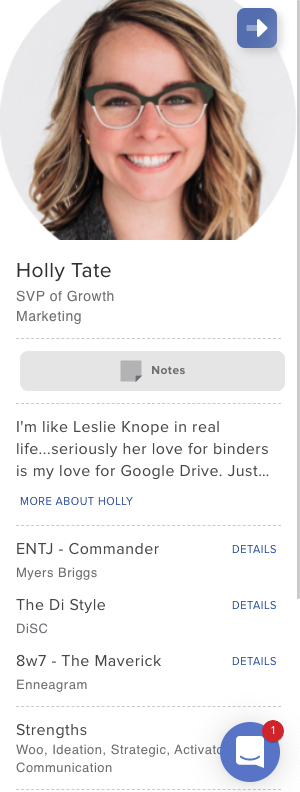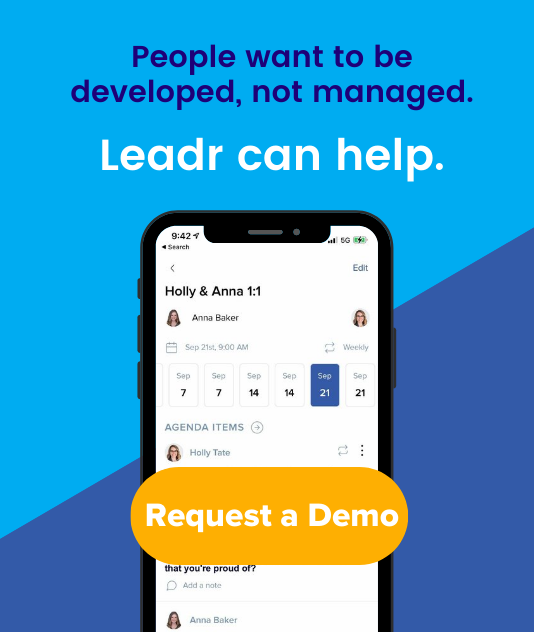Four Ways To Use Personality Assessments As A Leadership Development Tool
Are there people in your workplace that you naturally enjoy coaching and mentoring? If so, have you ever stopped to think about why?
With a little reflection, it’s probably because 1) they are eager to learn and grow, and 2) because you each have a clear understanding of their unique strengths and weaknesses which allows you to effectively coach them.
But what if, without even knowing someone, you had a cheat sheet of their personality highlights? Leadership development would suddenly become a lot easier, right? As a leader, it’s critical to understand that one size does not fit all when coaching each of your team members. Knowing how each individual communicates, prefers to work, and naturally learns is vital to building trust and engagement.
This level of transparency could be a game-changer on your team, whether you’re a peer or a supervisor, as you set goals that maximize each team member's strengths, leading to more efficient and fulfilling work.
Personality assessments like the Enneagram, the DiSC, Myers Briggs, StrengthsFinder, or Working Genius are all fantastic tools to utilize on your team if you know how to use them to their full potential in the workplace. They give you a “cheat sheet” on many different aspects of personality, from communication style to strengths, weaknesses, and gifts.
Here are three ways to dig into utilizing personality assessments with your team and how they can elevate your work:
1. Make it part of your culture.
Personality assessments give us a common language to discuss our strengths and weaknesses in the workplace. When someone feels known and valued at work, it’s easier for them to see how they fit in the big picture and spurs them towards growth, self-reflection, and motivation.
Research from Gallup shows that only four in 10 U.S. employees strongly agree that the mission or purpose of their company makes them feel their job is important.
Reflect on this for a moment. Without feeling connected to your organization's mission, what motivates you to do your best at work?
On the other hand, if someone understands why they’re part of the team and they’re engaged in their daily work on some level, they’re more likely to be able to connect that individual purpose to the mission of the organization. As a leader, you can be instrumental in helping an employee see what they uniquely bring to the table, how that can further your mission, and how they can help you reach organizational goals.
Before you can coach someone to develop and utilize their strengths, you have to identify them. That’s where personality assessments come in. Here are some of the most popular workplace assessments used to empower more valuable communication, development, and productivity.
- Myers Briggs - Katharine Cook Briggs and Isabel Briggs Myers, a mother-daughter team, were pioneers in developing this personality assessment, which is based on the psychological principles of Carl Jung. This type is expressed in 16 different combinations of four preferences, based on how each person uses perception and judgment in the world. Isabel once said “when people differ, a knowledge of type lessens friction and eases strain. In addition, it reveals the value of differences. No one has to be good at everything.”
Use Cases: Myers Briggs is a well-rounded assessment for a diverse team that can help you determine which areas someone is strongest in, making it ideal for leadership development and relationship building. Recognizing the idea that not every person has to be good at everything helps each individual dive into their strengths and feel comfortable developing their weaknesses. Myers Briggs is used by numerous companies around the globe including consulting firms, McKinsey, Bain, Deloitte and Accenture to name a few. - DiSC - the DiSC Assessment is a simpler assessment: after a test that gauges how you respond to challenges, how you influence others, your preferred pace, and how you respond to rules and procedures, you receive a scaled color-coded map showing where you fall in four categories of personality: dominance (D), influence (i), steadiness (S), and conscientiousness (C). This test measures tendencies and preferences, or patterns of behavior, and is a great way to start a conversation - or know how to communicate well with others on your team as you learn which “color” is highest for them.
Use Cases: DiSC is easy to implement in the workplace because of its simplicity. Your staff only needs to understand 4 “types” and which of their colleagues is high or low in those areas. While simplicity can be beneficial, also remember that our personalities are complex. Trying to minimize people into one of four types can leave room for confusion or misunderstanding. Organizations such as American Express, AT&T, Blue Cross/Blue Shield, and Boeing use DiSC to build stronger teams in the workplace. - Enneagram - The Enneagram may arguably be the most fun and interpersonal assessment, but it can be a great tool to use in a work context as well. A simple assessment reveals where participants fall in 9 different types, with a range of other more complex discussion points, including wings, dominant types, and more.
Use Cases: By understanding how you connect, react, and perceive the world, you can then dive deeper into how each type interacts with others and perceives itself as driven by core tendencies or “centers,” and what growth or stress trajectories look like for each type. This is an especially good starting place for leadership development as someone begins the journey towards leadership growth opportunities. Once you know what your ‘self’ looks like in growth, it’s much easier to visualize and tackle a plan for how to get there. Organizations including Toyota, Avon, and The CIA use the enneagram for leadership development. - Strengths Finder - Also known as CliftonStrengths, this assessment is best summed up through a quote from innovator Don Clifton who asked “what would happen if we studied what was right with people versus what's wrong with people?" CliftonStrengths does just that: a thorough and thoughtful questionnaire leads test-takers to a series of 34 themes that are organized into four categories of strengths.
Use Cases: This assessment will help your team clarify both what they uniquely do well and what they need help accomplishing from others. In other words, it highlights a list of strengths so your team can be empowered to lead from there with confidence. - Working Genius - This is an assessment that was developed by Patrick Lencioni and The Table Group. It focuses on six areas of “genius” which you can remember by the acronym “Widget.”
Use Cases: Lencioni says that he developed this model to help others discover their list of personal strengths or their “work genius” which ultimately leads them to both personal and professional joy and fulfillment. For leaders, this means higher engagement and higher productivity.
Regardless of which assessment you take, each of these tests is designed to help you tap into your personal strengths and coach others to do the same. You may find that it encourages you in the role you’re in, or motivates you to pursue an opportunity that is truly a passion and a calling.
2. Make it a focal point
A visible reminder can go a long way in reminding your team members and their peers what value they uniquely bring to the team. You might find that a desktop display of your personality results might be helpful for someone approaching your desk - they know immediately the best way to communicate with you!
Some teams have printed out profiles in a little frame, or displayed on a bulletin board. However you display it, it’s a great conversation starter as you get to know each other better and learn how to work together with both efficiency and enjoyment.
At Leadr, we display our personality types for the different assessments right on our profile within the Leadr software where we plan and conduct meetings as seen below.

Having this information readily available allows team members to review personality styles before a meeting as a reminder of how each team member learns best, communicates naturally, prefers to give and receive feedback. Like the way Leadr allows you to access meaningful insights? Request a demo of the software to see more.
It’s another great way to keep this a key part of our culture and a focus during meetings - how we interact with each other leads to how well we can work together to reach a goal or solve a problem. In this sense, personality assessments shift from a fun exercise to a powerful effectiveness tool.
3. Construct teams using personality assessment data
Once you are openly discussing individual strengths in the workplace, use this information to structure teams, make intentional hiring decisions, and delegate. Rather than using a resume of experience to determine the people working on specific projects, remember that people are more impactful when they’re utilizing their passions.
4. Make it a part of team development
Personality assessments shouldn’t be just a handout at a team retreat that is never looked at again - just as your personality is a foundational part of your identity, so it should be true at work too. Who you are in your work - perhaps a place you spend a majority of your time and energy each day - is a key part of how you do work.
We encourage you to build what you learn from taking a personality assessment into the rhythms of your team - maybe you reflect on it with a direct report during their one on one, or help launch them on a personalized growth plan. Maybe there is a development book related to a personality assessment - the enneagram has a few great ones that focus on the individual and types in relation to each other - and take time to go through it as a team or in groups.
Another great way to build personality assessments and highlighting someone’s list of skills or unique strengths is to say it out loud (or write it down, if that’s more your style). Take some time to call someone out when you see them doing something great that utilizes their list of skills.
Proactively try to catch someone on your team who is functioning in their strengths, and celebrate them! Share it with the rest of the team, because that can be a powerful reminder not just to that person of their value and why their unique skills are needed by the team, but also encourage others on the team that they don’t need to be able to do every job - they need to do the right job.
Implementing Personality Assessments For Impact
Research from Gallup found that people who use their strengths every day are three times more likely to report having an excellent quality of life. They're six times more likely to be engaged at work. And this group reports feeling 8% more productive, and 15% less likely to quit their jobs.
When you do the right job for you, you begin to eliminate stress, overwork, overwhelm, and all the other factors that lead to burnout and employee dissatisfaction. Instead, you replace all that with deep joy and contentment in the work you’re doing and an enthusiasm to jump in and serve where your strengths are.
By unlocking these insights into the way someone works, you can easily clarify leadership development opportunities and personalize mentorship and coaching to each team member down the road. The doors personality assessments open are far more than just an afternoon of discovery - it’s a long-term investment in the future of your team and your organization.
As a leader, it’s critical to understand that one size does not fit all when coaching each of your team members. Knowing how each individual communicates, prefers to work, and naturally learns is vital to building trust and engagement. Gaining insight into someone’s unique personality and list of skills is a great way to get to know someone but it’s an even better way to do more efficient work that highlights a culture of passion and development.
To take a deeper dive into the Leadr software and see the other ways our platform drives employee engagement and encourages individual development. Request a demo with our team here!
Which personality assessments does your team use to empower your teams? We’d love to hear from you in the comments section.
Share this
You May Also Like
These Related Stories

[2 Min Read] Why 1:1s Are Your Most Important Meeting

4 Game-Changing Outcomes Of A Healthy Feedback Culture




No Comments Yet
Let us know what you think